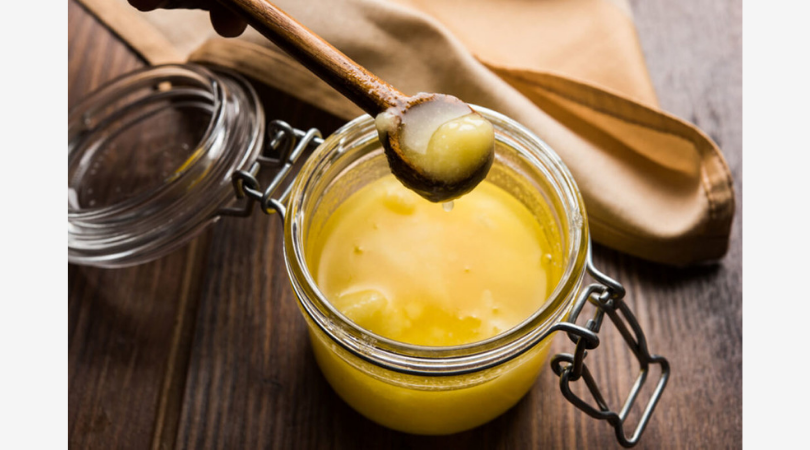Ghee has health benefits as well as harmful effects to the body.
Advantages of ghee:
- Daily consumption increases mental and physical health which keeps body healthy.
- Improves eyesight and retains tendons
- Used in gaining weight
- Contains fat soluble vitamin A, D, E and K.
- Essential for certain fats in the body which performs energetic functions such as strengthening cell membranes, protecting the stomach and preserve the nerve, brain and skin
- Helps in improving digestive strength by revitalizing secretion of enzymes
- Helps enhancing bone strength and stamina
- Offers better nourishment to pregnant ladies as well as the foetus and prevents newborn from having any birth problems like bone disorders

Disadvantages of ghee:
- Consuming unnecessary amount rapidly increases the weight which leads to the risk of several diseases
- Increases cholesterol
- Harmful for pregnant ladies due to increase in the weight if consumed more than the required amount
- Contains fatty acids which increases blood pressure making people prone to heart attacks
- People with jaundice or any abdominal discomfort should avoid ghee as it may lead to major problem of the organs
Healthy people are recommended to have 1 tablespoon i.e. 15g of ghee per day to get all the benefits (people with
normal BMI and not suffering from any medical condition).
Preferably, 1 teaspoon thrice a day will do the job. Ghee consists entirely of fat. Even though it might be healthy saturated fat, it’s not healthy to consume it in large amounts.
Ghee vs Butter & Oil :
Oil comprises of unsaturated fats whereas butter is a natural dairy product and comprises saturated fats and
milk protein. The fats in butter are heart-healthy while omega-6 fatty acids & PUFA present in oils may cause health issues because of inflammation in the body
and therefore should be consumed in moderation.
Ghee on the other hand is packed with
Conjugated Linoleic Acid (CLA) which has a lot of health benefits. Ghee is loaded with butyrate which has proven to
improve gut health. It has a similar nutrition profile to butter and is rich in saturated fatty acids and fat-soluble
vitamins A, D, E and K.
Milk solids from the butter are removed in the processing of ghee by skimming and straining to make it free from lactose and casein, because of which lactose and casein-intolerant individuals can also have ghee.
Ghee has a higher smoking point than butter and oil and that makes it much better for a variety of cooking and sautéing needs, preventing the food from burning.


